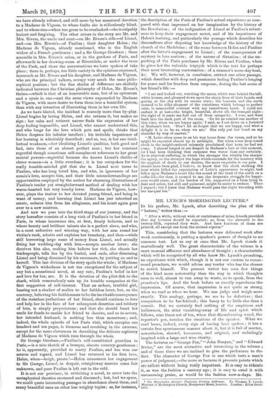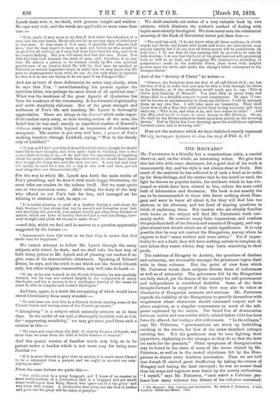MR. LYNCH'S MORNINGTON LECTURE.* IN his preface, Mr. Lynch, after
describing the plan of this- " lecture," writes thus :—
"After a while, without wish or contrivance of mine, friends provided that my lectures should be reported ; so, from the eleventh to the twenty-fifth, reported they were. And here fourteen of them are printed, all except one from the revised reports."
This, considering that the lectures were delivered week after- week continuously, is putting a speaker's powers of thought to no- common test. Let us say at once that Mr. Lynch stands it- marvellously well. The great characteristic of the volume is a most unusual affluence and abundance of thought ; a characteristic' which will be recognized by all who know Mr. Lynch's preaching,. an experience with which, though it is not our custom to recom- mend preachers, we would advise any reader who has the chance to enrich himself. The present writer has seen few things of the kind more noteworthy than the way in which thoughts. seem to well, almost to run away to waste, so to speak, from the preacher's lips. And the book before us exactly reproduces the- impression. Of course, that impression is not quite as strong, when we read as when we hear. We can judge and weigh more. exactly. This analogy, perhaps, we see to be defective ; that comparison to be far-fetched ; this fancy to be little else than a conceit. But we certainly find nothing of the emptiness and hollowness, the utter vanishing-away of life and spirit which follows, nine times out of ten, when that disenchanting wand, the- reporter's pen, touches the creations of the speaker. What we- read bears, indeed, every sign of having been spoken ; it has a. certain free spontaneous manner about it, but it is full of matter,. nevertheless, shrewd, humorous, and original, and unfailingly inspired with a large and wise charity.
The lectures on" George Fox," " John Bunyan," and "Edward Irvine," are the most attractive and interesting in the volume ; and of these three we are inclined to give the preference to the first. The character of George Fox is one which tests a man's power of judgment,—the more so because it presents points which are salient without being really important. It is easy to ridicule it, as was the fashion a century ago ; it is easy to extol it with unreasoning praise, as would be the fashion now-a-days. Mr.- * The Morningtort Lecture: Thursday Ereniray Addresses. By Thomas T. Lynch, Minister of Mornington Church, Hampstead Road, London. London: Elliot Stock. 1870.
Lynch deals with it, we think, with genuine insight and wisdom. He says very well, and the words are applicable to more cases than one :-
"Now, mark, it may seem to us that if God takes the education of a man into his own hands, Ho should not let us see any signs of deficiency in that man. It may seem, if God says, 'I specially will educate that man,' that we may expect to have a man put before us who should be as good for all services, as if mon had done their best for him, and be in no respect lacking. But you will never find that the case. Never. You will find that God honours the work of men, and, therefore, if at any time He selects a person to be trained chiefly by His own spiritual providences of an interior kind, He will let that man be marked as deficient in several important ways, in order that we may know that Ho puts no disparagement upon what we can do, but only wants to instruct is that it is no use our trying to do our part if we disregard His."
And one at least of these deficiencies he notes very clearly, when he says that Fox, " notwithstanding his protest against the spiritless letter, was perhaps the most literal of all spiritual men." What was the weakness of the great Apostle of Quakerism has 'been the weakness of the community. It has formalized spirituality and made simplicity elaborate. But of the great strength and nobleness of Fox's life and teaching Mr. Lynch is thoroughly
appreciative. There are things in his Journal which make super- ficial readers carry away, as their leading notion of the man, the belief that he was mad, exactly as superficial readers of Boswell's -Johnson carry away little beyond an impression of rudeness and arrogance. The matter is put very well here, a impos of Fox's
walking barefoot through Lichfield, crying, "Woe to the bloody city of Lichfield!"
"If you and I had seen him dolt and heard his voice, though we should most likely have thought, and been quite right in thinking, that it was a mad kind of thing to do,—if we had had the opportunity of inquiring about the matter and talking with him afterwards, we should have found that though the thing was mad the man was not. A man not mad may .act madly, be mad for a day, for a day or two now and then, yet not mad altogether and characteristically:'
For the way in which Mr. Lynch sets forth the main truths of Fox's preaching, and he does it with much happy illustration, we 'must refer our readers to the volume itself. But we must quote -one or two sentences more. After telling the story of the lady who offered to cut Fox's hair for him, and managed on his -refusing to abstract a curl, he says :—
" It is rather pleasing to read of a Quaker having a curl about his lair, because it just shows that try to smooth and formalise your hair and anything else you will, you cannot utterly get away from the laws of nature, which are laws of variety that will put a curl into things, how- ever straight and plain we choose to make them."
—and this, which we find said in answer to a question apparently suggested by the lecture :-
"Amusements have this value to us, that they do assert that God 'made man for happiness."
We cannot attempt to follow Mr. Lynch through the many subjects with which he deals, and we shall take the best way of .both doing justice to Mr. Lynch and of pleasing our readers if we .give some of his characteristic utterances. Speaking of Edward Irvine, he says, and the truth is one which not the Scotch Church -only, but other religious communities, may well take to heart :—
" So far as he was trained in the Scotch University he was carefully trained, but he was not trained largely in the comparison of many theologies, and for a person to be a theologian worthy of the name he must be able to compare and connect theologies."
And here, again, is a truth the recognizing of which would have saved Christianity from many scandals :—
"No real man can ever live in a Church without rending some of the 'Church bonds and tearing some of the Church garments."
4, Almsgiving " is a subject which naturally attracts us in these And this quaint version of familiar words may help us to be patient under a burden which is not more easy for being more familiar :— " If it is more blessed to give than to receive, it is much more blessed to be a ratepayer than a pauper, and we ought to account our rate- Taping as alms." From the same lecture we quote this "Our eivilizAtion is a great braggart, and I know of no exacter or more awful emblem of a civilization that is a braggart and yet would count itself a god than King Herod, who 'gave not God the glory' and was eaten with worms. A civilization that gives not the God of justice and goodhess the glory will be eaten of paupers." We shall conclude our notice of a very valuable book by two extracts, which illustrate the author's method of dealing with topics more strictly theological. We have never seen the substantial meaning of the Book of Revelation better put than thus:— " The soul has said, 'I do not know what all these emblems, in which angels and devils, and beasts with heads and horns, are introduced, may exactly signify, but I do see that all brute-power will be overthrown by holy love ; I do see that all vain cunning will be proved to be vain by holy wisdom; I do see that the Lord of the great heavens will, governing here as well as on high, and managing His transactions according to preparations made in the invisible Scene, ;bear down with helpful powers upon the earth, and make the changes below correspond to the changes above." And of the "divinity of Christ" he writes:— " Observe, the Scripture does not first of all call Christ God ; no, but the Son of God, in order that you may be able to look through the finite to the Infinite ; as if the revelation would teach you to say, This is God's holy limiting of Himself.' You limit Him in many ways, and shape Him in a dreadful manner to your imagination. He says, can- not be known in my immensity to these, my children; I will be amongst them as my own Son. I will take upon me humanity. They shall know first of all a Man that shall excite their loving curiosity, and they shall say, "Who is he, and what is he, and how comes he thus?" And this Man shall not Le in haste to claim homage to His Divinity. Oh no, Ho shall let the Divine splendour dawn upon men quietly as the morning dawns.' God in Christ has been dawning upon the world these eighteen hundred years, and is dawning still." Does not the sentence which we have italicized exactly represent the mix apinsey,a6y hriourg 76 shut lea Oscp of Phil. ii. 6?



































 Previous page
Previous page